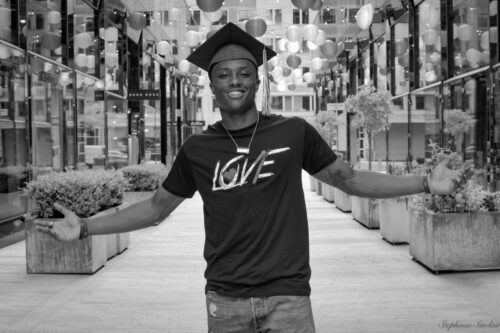Happiness, to RuQuan Brown ’24, simply looks like being a good father and husband one day.
These two goals typically stand as supporting actors to larger career ambitions. Yet Brown’s childhood exposures to gun violence led him to reevaluate his desire for the two. Growing up between Seattle, Dallas, and Washington, D.C., he lost his high school football teammate and almost his cousin to gun violence before his junior year of high school. When he was only 5 years old, his grandfather was shot in the head.
“When I was only five years old, I was thinking about ‘how can I change the world?’” reflects Brown. “Most of my classmates, at age five …. Are thinking about how they can enjoy the world more. At some point in their lives they realize that the world sucks and they stop and ask how to make it better. But they’ve been enjoying it for so long that it’s hard to change that mentality.”
At age 17, Brown founded Love1, an apparel company that donates a large portion of its proceeds to families and communities in the D.C. area who have lost loved ones to gun violence. In addition to funding funeral costs and other medical expenses, Love1 supports One Gun Gone, an organization that buys guns off individuals in the pursuit of gun prevention and safer neighborhoods. To this date, Love1 has raised over $10k towards these causes. Its namesake: his teammates’ jersey number.
“I named it Love1 because I wanted the world to know who #1 was… and not just know him but love him,” Brown says. He advocates that “putting Love First” is the only option to a world ultimately free of deadly misuse of weapons.
“I named it Love1 because I wanted the world to know who #1 was… and not just know him but love him,”
Ruquan Brown
Brown notes that the week his teammate was murdered, at least four other teenagers fell victim to gun violence, all to the neglect of the community: no recognition, no accountability, and no celebration of life. What would have been a chance to take this wrongful teenage death as an opportunity to amend the criminal justice system, very little reaction occurred.
“The city didn’t do anything to recognize my friend … there were other students who were murdered that the city painted murals for and raised money for their families … but for my teammate, my friend, there was very little, if any of that,” he remarks.
He recalls coming up with the idea of the company in the locker room with his teammate, but ultimately taking no action. His initial business spark didn’t evolve until exactly a year later with the murder of his stepfather, yet another loved one in Brown’s life lost to gun violence.
Loving those who we don’t share commonalities with, as well as those who have previously wronged us, carries out the mission of Love1. Instead of retaliating against individuals or championing justice through the use of guns, Brown advocates for a more emotional remedy. To him, “Love is gun violence prevention.” And even though the word may be an abstract and blanketing term with a myriad of definitions, it is an unarguable place to start. Love may not translate directly to policy revision, but it does translate to a shift in personal mindset.
“Love is Gun Violence Protection”
RuQuan Brown sees the world differently. In his eyes, the world tends to take parenthood and family, his two personal aspirations, as given rights. Those who have been brutally exposed to humanity’s inhumanity, understand the foolishness of this traditionally regarded entitlement. A stable parent and family are not given rights, and we must hold these gifts with much more esteem. A collective movement towards this mentality can eventually create grounds for peace.
Marbella Marlo ’24 interviews Harvard students and faculty about their backgrounds, passions, and values every other week. Feel free to email mmarlo@college.harvard.edu with requests for future subjects.

